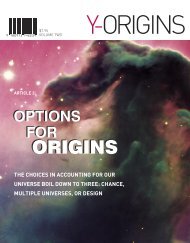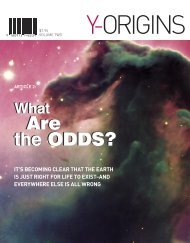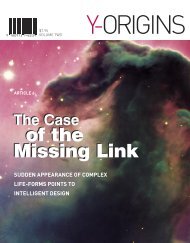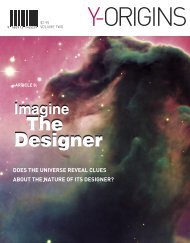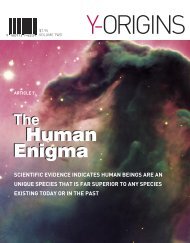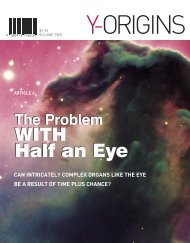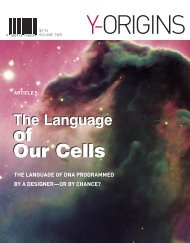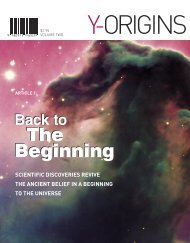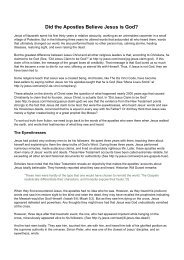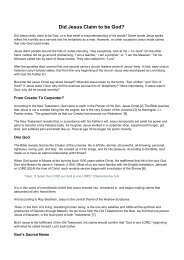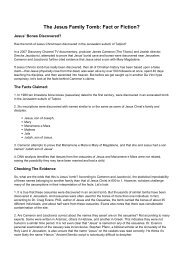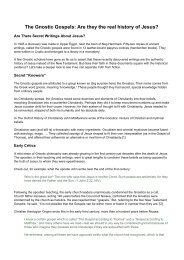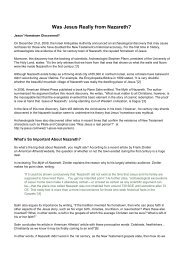1898
Create successful ePaper yourself
Turn your PDF publications into a flip-book with our unique Google optimized e-Paper software.
Has Science Discovered God?<br />
Einstein didn’t believe it was possible. Stephen Hawking said it might be the greatest scientific discovery<br />
of all time.<br />
What discovery has baffled the greatest scientific minds of the past century, and why has it caused them to<br />
rethink the origin of our universe? New, more powerful, telescopes have revealed mysteries about our universe<br />
that have raised new questions about the origin of life.<br />
Has science discovered God?<br />
But wait a minute! Hasn’t science proven we don’t need God to explain the universe? Lightning, earthquakes<br />
and even babies used to be explained as acts of God. But now we know better. What is it about this discovery<br />
that is so fundamentally different, and why has it stunned the scientific world?<br />
This discovery and what molecular biologists have learned about the sophisticated coding within DNA have many<br />
scientists now admitting that the universe appears to be part of a grand design.<br />
One cosmologist put it this way: “Many scientists, when they admit their views, incline toward the teleological or<br />
design argument.”[1]<br />
Surprisingly, many scientists who are talking about God have no religious belief whatsoever. [2]<br />
So, what are these stunning discoveries that have scientists suddenly speaking of God? Three revolutionary<br />
discoveries from the fields of astronomy and molecular biology stand out:<br />
1. The universe had a beginning<br />
2. The universe is just right for life<br />
3. DNA coding reveals intelligence<br />
The statements leading scientists have made about these discoveries may shock you. Let’s take a look.<br />
One-Time Beginning<br />
Since the dawn of civilization man has gazed in awe at the stars, wondering what they are and how they got<br />
there. Although on a clear night the unaided human eye can see about 6,000 stars, Hubble and other powerful<br />
telescopes indicate there are trillions of them clustered in over 100 billion galaxies. Our sun is like one grain of<br />
sand amidst the world’s beaches.<br />
However, prior to the 20th century, the majority of scientists believed our own Milky Way galaxy was the entire<br />
universe, and that only about 100 million stars existed.<br />
Most scientists believed that our universe never had a beginning. They believed mass, space and energy had<br />
always existed.<br />
But in the early 20th century, astronomer Edwin Hubble discovered the universe is expanding. Rewinding the<br />
process mathematically, he calculated that everything in the universe, including matter, energy, space and even<br />
time itself, actually had a beginning.<br />
Shockwaves rang loudly throughout the scientific community. Many scientists, including Einstein, reacted<br />
negatively. In what Einstein later called “the biggest blunder of my life,” he fudged the equations to avoid the<br />
implication of a beginning. [3]
Perhaps the most vocal adversary of a beginning to the universe was British astronomer Sir Fred Hoyle, who<br />
sarcastically nicknamed the creation event a “big bang.” He stubbornly held to his steady state theory that the<br />
universe has always existed. So did Einstein and other scientists until the evidence for a beginning became<br />
overwhelming. The “elephant in the room” implication of a beginning is that something or Someone beyond<br />
scientific investigation must have started it all.<br />
Finally, in 1992, COBE satellite experiments proved that the universe really did have a one-time beginning in an<br />
incredible flash of light and energy. [4] Although some scientists called it the moment of creation, most preferred<br />
referring to it as the “big bang.”<br />
Astronomer Robert Jastrow tries to help us imagine how it all began. “The picture suggests the explosion of a<br />
cosmic hydrogen bomb. The instant in which the cosmic bomb exploded marked the birth of the Universe.” [5]<br />
Everything from Nothing<br />
Science is unable to tell us what or who caused the universe to begin. But some believe it clearly points to a<br />
Creator. “British theorist, Edward Milne, wrote a mathematical treatise on relativity which concluded by saying,<br />
‘As to the first cause of the Universe, in the context of expansion, that is left for the reader to insert, but our<br />
picture is incomplete without Him.’” [6]<br />
Another British scientist, Edmund Whittaker attributed the beginning of our universe to “Divine will constituting<br />
Nature from nothingness.” [7]<br />
Many scientists were struck by the parallel of a one-time creation event from nothing with the biblical creation<br />
account in Genesis 1:1. [8] Prior to this discovery, many scientists regarded the biblical account of creation from<br />
nothing as unscientific.<br />
Although he called himself an agnostic, Jastrow was compelled by the evidence to admit, “Now we see how the<br />
astronomical evidence leads to a biblical view of the origin of the world.” [9]<br />
Another agnostic, George Smoot, the Nobel Prize winning scientist in charge of the COBE experiment, also<br />
admits to the parallel. “There is no doubt that a parallel exists between the big bang as an event and the Christian<br />
notion of creation from nothing.”[10]<br />
Scientists who used to scoff at the Bible as a book of fairy tales, are now admitting that the biblical concept of<br />
creation from nothing has been right all along.<br />
Cosmologists, who specialize in the study of the universe and its origins, soon realized that a chance cosmic<br />
explosion could never bring about life any more than a nuclear bomb would—unless it was precisely engineered to<br />
do so. And that meant a designer must have planned it. They began using words like, “Super-intellect,”<br />
“Creator,” and even “Supreme Being” to describe this designer. Let’s look at why.<br />
Finely-Tuned for Life<br />
Physicists calculated that for life to exist, gravity and the other forces of nature needed to be just right or our<br />
universe couldn’t exist. Had the expansion rate been slightly weaker, gravity would have pulled all matter back<br />
into a “big crunch.”<br />
We’re not talking about merely a one or two percent reduction in the universe’s expansion rate. Stephen<br />
Hawking writes, “If the rate of expansion one second after the big bang had been smaller by even one part in a<br />
hundred thousand million million, the universe would have re-collapsed before it ever reached its present size.”<br />
[11]<br />
On the flip side, if the expansion rate had been a mere fraction greater than it was, galaxies, stars and planets
could never have formed, and we wouldn’t be here.<br />
And for life to exist, the conditions in our solar system and planet also need to be just right. For example, we all<br />
realize that without an atmosphere of oxygen, none of us would be able to breathe. And without oxygen, water<br />
couldn’t exist. Without water there would be no rainfall for our crops. Other elements such as hydrogen, nitrogen,<br />
sodium, carbon, calcium, and phosphorus are also essential for life.<br />
But that alone is not all that is needed for life to exist. The size, temperature, relative proximity, and chemical<br />
makeup of our planet, sun, and moon also need to be just right. And there are dozens of other conditions that<br />
needed to be exquisitely fine-tuned or we wouldn’t be here to think about it. [12]<br />
Scientists who believe in God may have expected such fine-tuning, but atheists and agnostics were unable to<br />
explain the remarkable “coincidences.” Theoretical physicist Stephen Hawking, an agnostic, writes, “The<br />
remarkable fact is that the values of these numbers seem to have been very finely adjusted to make possible the<br />
development of life.”[13]<br />
Accident or Miracle?<br />
But couldn’t this fine-tuning be attributed to chance? After all, odds-makers know that even long shots can<br />
eventually win at the racetrack. And, against heavy odds, lotteries are eventually won by someone. So, what are<br />
the odds against human life existing by chance from a random explosion in cosmic history?<br />
For human life to be possible from a big bang defies the laws of probability. One astronomer calculates the odds<br />
at less than 1 chance in a trillion trillion trillion trillion trillion trillion trillion trillion trillion trillion trillion trillion. [14] It<br />
would be far easier for a blind-folded person—in one try— to discover one specially marked grain of sand out of all<br />
the beaches of the world.<br />
Another example of how unlikely it would be for a random big bang to produce life is one person winning over a<br />
thousand consecutive mega-million dollar lotteries after purchasing only a single ticket for each.<br />
What would be your reaction to such news? Impossible—unless it was fixed by someone behind the scenes, which<br />
is what everyone would think. And that is what many scientists are concluding—Someone behind the scenes<br />
designed and created the universe.<br />
This new understanding of how miraculous human life is in our universe led the agnostic astronomer George<br />
Greenstein to ask, “Is it possible that suddenly, without intending to, we have stumbled upon the scientific proof of<br />
the existence of a Supreme Being?”[15]<br />
However, as an agnostic, Greenstein maintains his faith in science, rather than a Creator, to ultimately explain our<br />
origins. [16]<br />
Jastrow explains why some scientists are reluctant to accept a transcendent Creator,<br />
There is a kind of religion in science; it is the religion of a person who believes there is order and harmony<br />
in the Universe…This religious faith of the scientist is violated by the discovery that the world had a<br />
beginning under conditions in which the known laws of physics are not valid, and as a product of forces or<br />
circumstances we cannot discover. When that happens, the scientist has lost control. If he really examined<br />
the implications, he would be traumatized. [17]<br />
It is understandable why scientists like Greenstein and Hawking seek other explanations rather than attribute our<br />
finely-tuned universe to a Creator. Hawking speculates that other unseen (and unprovable) universes may exist,<br />
increasing the odds that one of them (ours) is perfectly fine-tuned for life. However, since his proposal is<br />
speculative, and outside of verification, it can hardly be called “scientific.” Although he is also an agnostic, British<br />
astrophysicist Paul Davies dismisses Hawking’s idea as too speculative. He writes, “Such a belief must rest on
faith rather than observation.” [18]<br />
Although Hawking continues leading the charge to explore purely scientific explanations for our origins, other<br />
scientists, including many agnostics, have acknowledged what appears to be overwhelming evidence for a<br />
Creator. Hoyle wrote,<br />
“A common sense interpretation of the facts suggests that a superintellect has monkeyed with physics, as<br />
well as chemistry and biology, and that there are no blind forces worth speaking about in nature.”[19]<br />
Although Einstein wasn’t religious, and didn’t believe in a personal God, he called the genius behind the<br />
universe “an intelligence of such superiority that, compared with it, all the systematic thinking and acting of human<br />
beings is an utterly insignificant reflection.”[20]<br />
Atheist Christopher Hitchens, who spent much of his life writing and debating against God, was most perplexed by<br />
the fact that life couldn’t exist if things were different by just “one degree or one hair.” [21]<br />
Davies acknowledges,<br />
There is for me powerful evidence that there is something going on behind it all. It seems as though<br />
somebody has fine-tuned nature’s numbers to make the Universe…. The impression of design is<br />
overwhelming. [22]<br />
DNA: The Language of Life<br />
Astronomy is not the only area where science has seen evidence for design. Molecular biologists have discovered<br />
intricately complex design in the microscopic world of DNA. In the past century, scientists learned that a tiny<br />
molecule called DNA is the “brains” behind each cell in our bodies as well as every other living thing. Yet the<br />
more they discover about DNA, the more amazed they are at the brilliance behind it.<br />
Scientists who believe the material world is all that exists (materialists), like Richard Dawkins, argue DNA evolved<br />
by natural selection without a Creator. Yet even most ardent evolutionists admit that the origin of DNA’s intricate<br />
complexity is unexplainable.<br />
DNA’s intricate complexity caused its co-discoverer, Francis Crick, to believe that it could never have originated<br />
on earth naturally. Crick, an evolutionist who believed life is too complex to have originated on earth, and must<br />
have come from outer space, wrote,<br />
An honest man, armed with all the knowledge available to us now, could only state that in some sense, the<br />
origin of life appears at the moment to almost be a miracle, so many are the conditions which would have<br />
had to have been satisfied to get it going.[23]<br />
The coding behind DNA reveals such intelligence that it staggers the imagination. A mere pinhead of DNA<br />
contains information equivalent to a stack of paperback books that would encircle the earth 5,000 times. And DNA<br />
operates like a language with its own extremely complex software code. Microsoft founder Bill Gates says that the<br />
software of DNA is “far, far more complex than any software we have ever developed.”[24]<br />
Dawkins and other materialists believe that all this complexity originated through natural selection. Yet, as Crick<br />
remarked, natural selection could never have produced the first molecule. Many scientists believe that the coding<br />
within the DNA molecule points to an intelligence far exceeding what could have occurred by natural causes.<br />
In the early 21st century, leading atheist Antony Flew’s atheism came to an abrupt end when he studied the<br />
intelligence behind DNA. Flew explains what changed his opinion.
What I think the DNA material has done is to show that intelligence must have been involved in getting<br />
these extraordinarily diverse elements together. The enormous complexity by which the results were<br />
achieved look to me like the work of intelligence…. It now seems to me that the finding of more than fifty<br />
years of DNA research have provided materials for a new and enormously powerful argument to<br />
design.[25]<br />
Although Flew was not a Christian, he admitted that the “software” behind DNA is far too complex to have<br />
originated without a “designer.” The discovery of the incredible intelligence behind DNA has, in this former<br />
leading atheist’s words, “provided materials for a new and enormously powerful argument to design.”<br />
Fingerprints of a Creator<br />
Are scientists now convinced that a Creator has left his “fingerprints” on the universe?<br />
Although many scientists are still bent on squeezing God out of the universe, most recognize the religious<br />
implications of these new discoveries. In his book, The Grand Design, Stephen Hawking, who doesn’t believe in<br />
a personal God, attempts to explain why the universe doesn’t need God. Yet when faced with the evidence, even<br />
Hawking, has also admitted, “There must be religious overtones. But I think most scientists prefer to shy away<br />
from the religious side of it.”[26]<br />
As an agnostic, Jastrow had no Christian agenda behind his conclusions. However, he freely acknowledges the<br />
compelling case for a Creator. Jastrow writes of the shock and despair experienced by scientists who thought<br />
they had squeezed God out of their world.<br />
For the scientist who has lived by his faith in the power of reason, the story ends like a bad dream. He has<br />
scaled the mountains of ignorance; he is about to conquer the highest peak; as he pulls himself over the<br />
final rock, he is greeted by a band of theologians who have been sitting there for centuries. [27]<br />
A Personal Creator?<br />
If there is a superintelligent Creator, the question arises, what is he like? Is he just some Force like in Star Wars,<br />
or is he a personal Being like us? Since we are personal and relational beings, wouldn’t the one who created us<br />
also be personal and relational?<br />
Many scientists like Arthur L. Schawlow, Professor of Physics at Stanford University, winner of the Nobel Prize in<br />
physics, believe that these new discoveries provide compelling evidence for a personal God. He writes, “It seems<br />
to me that when confronted with the marvels of life and the universe, one must ask why and not just how. The<br />
only possible answers are religious…. I find a need for God in the universe and in my own life.”[28] If God is<br />
personal and since he has given us the ability to communicate, wouldn’t we expect him to communicate with us<br />
and let us know why we are here?<br />
As we have seen, science is unable to answer questions about God and the purpose for life. However, since the<br />
Bible was right about creation from nothing, might it also be trustworthy regarding God, life and purpose?<br />
Two thousand years ago a man set foot on our planet who claimed to have the answer to life. Although his time<br />
on earth was brief, his impact changed the world, and is still felt today. His name is Jesus Christ.<br />
The eyewitnesses to Jesus Christ tell us that he continually demonstrated creative power over nature’s laws.<br />
They tell us he was wise, humble and compassionate. He healed the lame, deaf and blind. He stopped raging<br />
storms instantly, created food for the hungry on the spot, turned water into wine at a wedding, and even raised the<br />
dead. And they claimed after his brutal execution, he rose from the dead.
They also tell us that Jesus Christ is the one who flung the stars into space, fine-tuned our universe and created<br />
DNA. Could he be the one of whom Einstein unknowingly referred to as the “superintelligence” behind the<br />
universe. Could Jesus Christ be the one of whom Hoyle unknowingly referred to as having “monkeyed with<br />
physics, chemistry and biology?”<br />
Has the mystery of who was behind the big bang and the intelligence of DNA been revealed in the following<br />
account from the New Testament?<br />
Now Christ is the visible expression of the invisible God. He existed before creation began, for it was<br />
through him that everything was made, whether spiritual or material, seen or unseen. Through him, and for<br />
him, also, were created power and dominion, ownership and authority. In fact, every single thing was<br />
created through, and for him….Life from nothing began through him, and life from the dead began through<br />
him, and he is, therefore, justly called the Lord of all. [29]<br />
Jesus spoke with authority about God’s love for us and the reason he created us. He said he has a plan for our<br />
lives, and that plan centers on a relationship with himself. But for that relationship to be possible, Jesus had to die<br />
on the cross for our sins. And it was necessary for him to rise from the dead so that we too could have life after<br />
death. [30]<br />
If Jesus was the Creator, he certainly would have the power over life and death. And those closest to him claim<br />
they saw him alive after he died and was buried for three days.<br />
Did Jesus Really Rise From The Dead?<br />
The apostle Paul tells us that life from the dead began through Jesus Christ. The eyewitnesses to Jesus Christ<br />
actually spoke and acted like they believed he physically rose from the dead after his crucifixion. If they were<br />
wrong then Christianity has been founded upon a lie. But if they were right, such a miracle would substantiate all<br />
Jesus said about God, himself, and us.<br />
But must we take the resurrection of Jesus Christ by faith alone, or is there solid historical evidence? Several<br />
skeptics began investigations into the historical record to prove the resurrection account false. What did they<br />
discover?<br />
Endnotes<br />
1. Harrison, E. 1985. Masks of the Universe. New York, Collier Books, Macmillan, pp. 252, 263.<br />
2. An atheist believes God doesn’t exist. An agnostic believes we can’t know.<br />
3. Brian Greene, The Elegant Universe (New York: Vintage, 2000), 81-82.<br />
4. George Smoot and Keay Davidson, Wrinkles in Time (New York: Avon, 1993), 241.<br />
5. Robert Jastrow, God and the Astronomers, (London: W. W. Norton, 1992), 13.<br />
6. Ibid., 104.<br />
7. Ibid., 103.<br />
8. Genesis 1:1, “In the beginning God created the heaven and the earth.”<br />
9. Jastrow, 14.<br />
10. Smoot and Davidson, 17.<br />
11. Stephen Hawking, The Illustrated A Brief History of Time (New York: Bantam, 1996), 156.<br />
12. Hugh Ross, The Creator and the Cosmos (3 rd ed.) (Colorado Springs, CO: NavPress, 2001), 224.<br />
13. Stephen Hawking, A Brief History of Time (New York: Bantam, 1990), 125.<br />
14. Hugh Ross, The Creator and the Cosmos (Colorado Springs, CO: NavPress, 2001), 198.
Powered by TCPDF (www.tcpdf.org)<br />
15. George Greenstein, The Symbiotic Universe (New York: William Morrow, 1988), 27.<br />
16. Ibid., 189.<br />
17. Jastrow, 105.<br />
18. Paul Davies, God and the New Physics (New York: Simon & Schuster, 1983), 174.<br />
19. Fred Hoyle, “Let there be Light,” Engineering and Science (November 1981).<br />
20. Albert Einstein, Ideas and Opinions—The World As I See It (New York: Bonanza, 1931), 40.<br />
21. http://www.youtube.com/watch?v=GDJ9BL38PrI<br />
22. Paul Davies, The Cosmic Blueprint (New York: Simon & Schuster, 1988), 203.<br />
23. Francis Crick, Life Itself (New York: Simon & Schuster, 1981), 88.<br />
24. Quoted in William A. Dembski and James M. Kushiner, eds., Signs of Intelligence (Grand Rapids, MI:<br />
Brazos, 2001), 108.<br />
25. Quoted in Gary Habermas, “My Pilgrimage from Atheism to Theism”: Interview with<br />
Antony Flew, Philosophia Christi, (Winter, 2005).<br />
26. John Boslough, Stephen Hawking’s Universe (New York: Avon, 1989), 109.<br />
27. Jastrow, 107.<br />
28. Margenau, H. and R. A. Varghese, eds. Cosmos, Bios, Theos: Scientists Reflect on Science, God, and the<br />
Origins of the Universe, Life, and Homo Sapiens (Open Court Pub. Co., La Salle, IL, 1992).<br />
29. Colossians 1:15-17, J. B. Phillips.<br />
30. John 3:16; John 14:19.<br />
Permission to reproduce this article: Publisher grants permission to reproduce this material without written<br />
approval, but only in its entirety and only for non-profit use. No part of this material may be altered or used out of<br />
context without publisher’s written permission. Printed copies of this article and Y-Origins and Y-Jesus magazine<br />
may be ordered at: http://jesusonlineministries.com/resources/products/<br />
© 2013 JesusOnline Ministries. This article is a supplement to Y-Jesus magazine by Bright Media Foundation &<br />
B&L Publications: Larry Chapman, Chief Editor.



